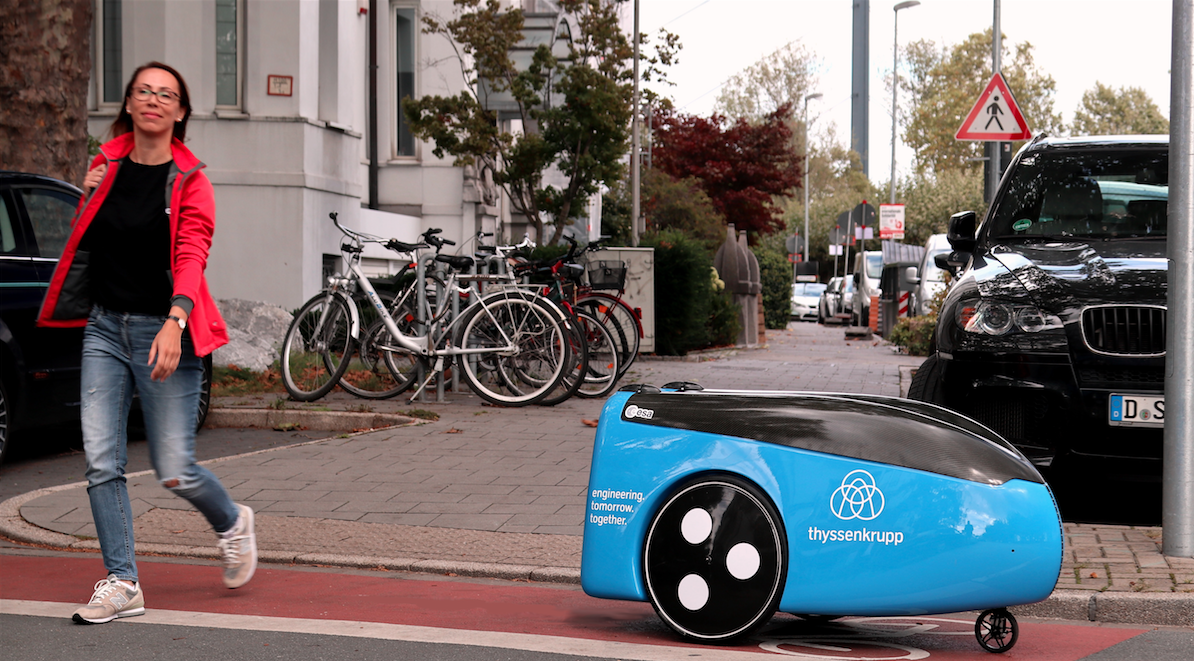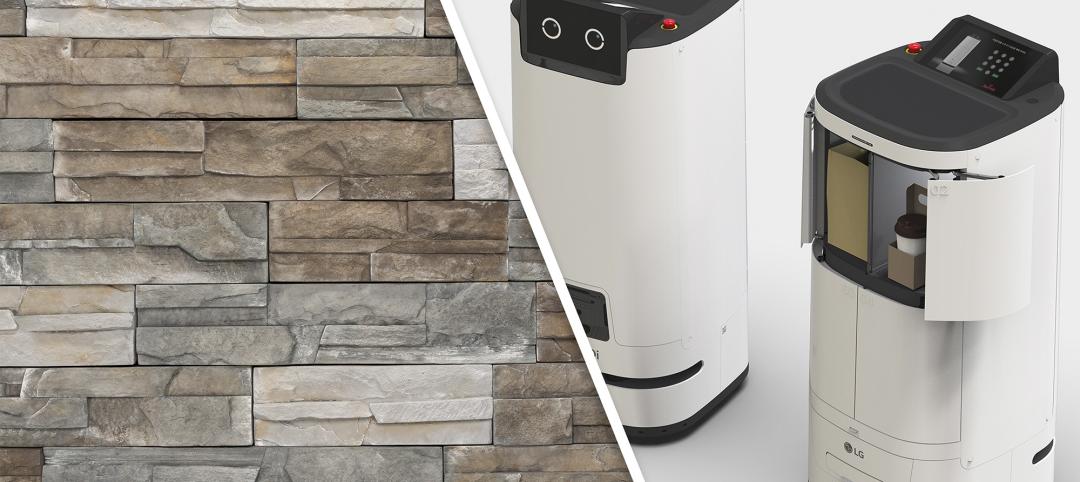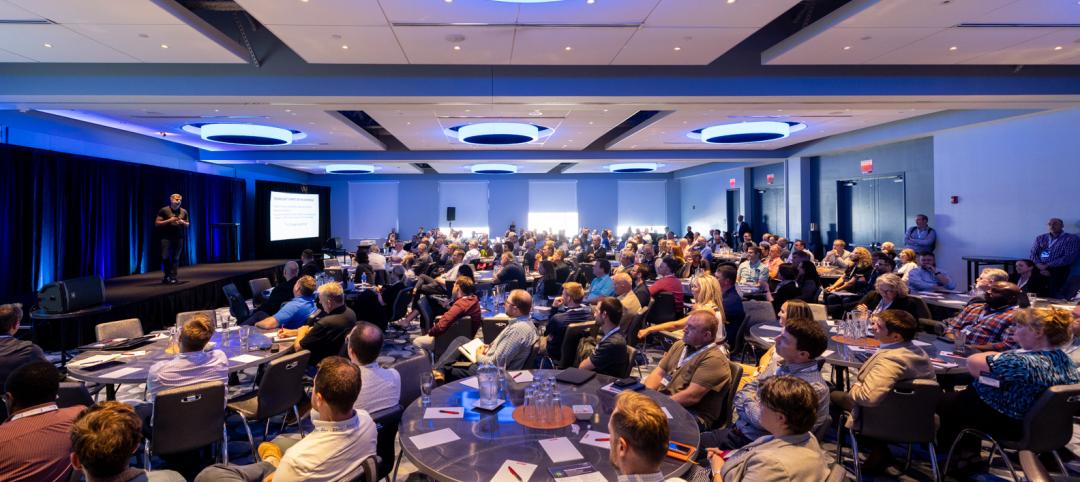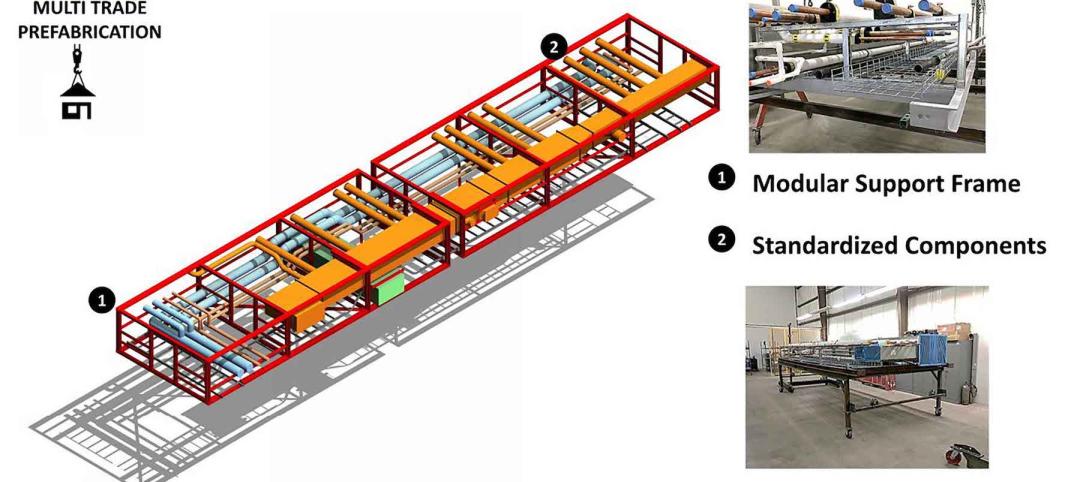Last week, vertical transportation giant thyssenkrupp debuted a novel technology that could transform its parts and materials supply chain in dense urban environments.
As part of a U.S. Senate Field Hearing on automotive innovation, January 24 at the Washington (D.C.) Auto Show 2018, thyssenkrupp showcased its newly developed self-driving delivery robot. Co-developed by software maker TeleRetail, the system is designed to transport spare parts and materials to field technicians working in busy, congested urban markets.
During elevator and escalator servicing sessions, spare parts are needed quickly, and a technician either has to drive back to base in his or her service vehicle or have it delivered by a colleague. With increased traffic clogging up city streets, the pressure on the supply chains is rapidly increasing, according to thyssenkrupp.
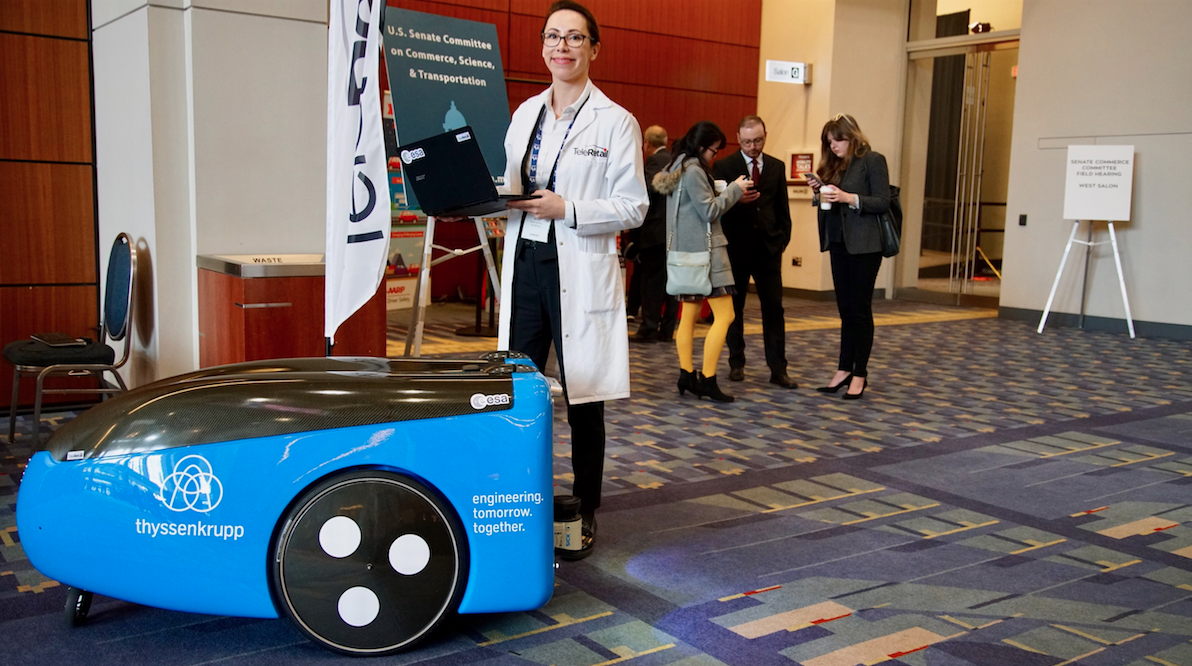 Xenia Scholl of TeleRetail poses with the delivery robot at the Washington (D.C.) Auto Show 2018. Photo courtesy thyssenkrupp
Xenia Scholl of TeleRetail poses with the delivery robot at the Washington (D.C.) Auto Show 2018. Photo courtesy thyssenkrupp
“This is a major urbanization challenge that our service technicians are already experiencing today,” said Ivo Siebers, Senior Vice President of Global Logistics, thyssenkrupp Elevator. “With driverless delivery robots, we could fill a gap and get spare parts from our warehouses to the jobsite faster, more efficiently, and with less impact on the environment.”
Measuring 33 inches wide, the delivery robots can travel on sidewalks and can carry payloads weighing up to 77 lbs. An online logistics platform allows technicians and the operations center to track the progress of deliveries in real time.
“Fast-growing American metropolitan areas need intelligent solutions to cover the last mile in delivering spare parts to our technicians,” added Siebers. “In connection with TeleRetail, we are testing autonomous vehicles to solve this growing logistical problem.”
Related Stories
Airports | Aug 22, 2024
Portland opens $2 billion mass timber expansion and renovation to its international airport
This month, the Portland International Airport (PDX) main terminal expansion opened to passengers. Designed by ZGF for the Port of Portland, the 1 million-sf project doubles the capacity of PDX and enables the airport to welcome 35 million passengers per year by 2045.
AEC Tech | Aug 19, 2024
Harnessing AI to revolutionize architectural design and creativity
Architects are wondering if AI will replace us. For Vessel, the gains offset the fear. We believe there is wisdom in the unattributed quote, “You won’t lose your job to AI. You will lose your job to someone using AI.”
Energy Efficiency | Aug 9, 2024
Artificial intelligence could help reduce energy consumption by as much as 40% by 2050
Artificial intelligence could help U.S. buildings to significantly reduce energy consumption and carbon emissions, according to a paper by researchers at the Lawrence Berkeley National Laboratory.
Products and Materials | Jul 31, 2024
Top building products for July 2024
BD+C Editors break down July's top 15 building products, from Façades by Design to Schweiss Doors's Strap Latch bifold door.
Smart Buildings | Jul 25, 2024
A Swiss startup devises an intelligent photovoltaic façade that tracks and moves with the sun
Zurich Soft Robotics says Solskin can reduce building energy consumption by up to 80% while producing up to 40% more electricity than comparable façade systems.
Great Solutions | Jul 23, 2024
41 Great Solutions for architects, engineers, and contractors
AI ChatBots, ambient computing, floating MRIs, low-carbon cement, sunshine on demand, next-generation top-down construction. These and 35 other innovations make up our 2024 Great Solutions Report, which highlights fresh ideas and innovations from leading architecture, engineering, and construction firms.
AEC Tech Innovation | Jul 4, 2024
Caution competes with inevitability at conference exploring artificial intelligence for design and construction
Hosted by PSMJ, AEC Innovate in Boston found an AEC industry anxiously at the threshold of change.
Contractors | Jun 4, 2024
Contractors expect to spend more time on prefabrication, according to FMI study
Get ready for a surge in prefabrication activity by contractors. FMI, the consulting and investment banking firm, recently polled contractors about how much time they were spending, in craft labor hours, on prefabrication for construction projects. More than 250 contractors participated in the survey, and the average response to that question was 18%. More revealing, however, was the participants’ anticipation that craft hours dedicated to prefab would essentially double, to 34%, within the next five years.
AEC Tech | Apr 30, 2024
Lack of organizational readiness is biggest hurdle to artificial intelligence adoption
Managers of companies in the industrial sector, including construction, have bought the hype of artificial intelligence (AI) as a transformative technology, but their organizations are not ready to realize its promise, according to research from IFS, a global cloud enterprise software company. An IFS survey of 1,700 senior decision-makers found that 84% of executives anticipate massive organizational benefits from AI.
BIM and Information Technology | Mar 11, 2024
BIM at LOD400: Why Level of Development 400 matters for design and virtual construction
As construction projects grow more complex, producing a building information model at Level of Development 400 (LOD400) can accelerate schedules, increase savings, and reduce risk, writes Stephen E. Blumenbaum, PE, SE, Walter P Moore's Director of Construction Engineering.


